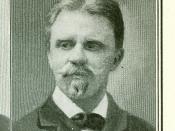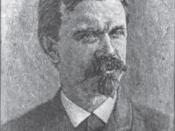It is with ardent horror that the prehistoric man first witnessed a solar eclipse; the predator moon swallowed up the sun until all light ceased and darkness fell onto the land. We, the more enlightened descendants, have also "suffered"ÃÂ from these eclipses. One such eclipse was the darkness of evil that fell upon Salem in 1692, when many men and women were accused of compacting with the devil. One of these men was John Procter, a prominent, noble, wise, and rather thoughtful man. He had made a few bad choices or mistakes in his life; but who hasn't, right? John Procter was a notable man who had a noble heart. His wife Elizabeth knew that John had made mistakes, one being his "affair"ÃÂ with Abigail. John made every effort to gain his wife's trust even though for many a year she turned a rather cold shoulder to him. He has always tried to do what is right, even in the last scene when he was about to be put to death, his deliberation was NOT over his life, his quarrel was towards himself wondering of he should go out there and possible mar the names of the other two people sentenced to death.
Now John Procter is no perfect man but what he does do is he tries to correct his wrongs in any way possible. One being when he chose to make the wrongs right by staying with his wife. Also John Procter is also a very wise man. Throughout the book there are many instances when he seems to know how to do something that is un-thought of almost instantaneously to match his counterpart. One example is at the end of the play when he is being forced to confess and refuses to sign the confession. Although he has actually confessed, he knows that if he signs the confession his name will be scarred, his family embarrassed, and he will have lied outright to the lord. Also, he always seems to know when to speak and when not to. I don't mean this in the childish way but on a much more mature level. He knew that if he came out immediately with the fact that Abigail told him that the "witching"ÃÂ were a hoax, then his credibility could be called into question, and subsequently his affair would be made public and he could hang for a "witch"ÃÂ. He also knew how to play people to get the sought after reaction that he desired. Even small instances like when he put salt in the rabbit stew then told his wife that it was "nicely seasoned"ÃÂ.
Last but certainly not least is the point that John Procter is a thoughtful man. He loves his wife Elizabeth. He would do anything for her including dying to save the honor of her name (which he later does by saying "show a stony heart now, and sink them with it later."ÃÂ). Also, when he was to be put to death he thought of the others saying, "they think to go like saints"ÃÂ. Meaning that who was he to dim the bright image that everyone had of Rebecca Nurse, whom everyone knew as near perfect and as Christian a girl to ever walk the earth.
All of this should make it rather evident that John Procter is a tragic hero in this play. He struggled to right, and when oppression turned his way, he continued to do what was right instead of what was easy and would get him ahead in the town. For all of this he would eventually be hung, suffering an unjust death. Although the end of hangings and the procedure was left out of the play, we do know one thing: a great blanket of darkness covered Salem that day.





